- Home
- Ann M. Martin
Claudia and the Great Search Page 4
Claudia and the Great Search Read online
Page 4
“Buh!” said Emily, whose tears were drying. I set her on the floor and she made a beeline for the channel changer.
David Michael held it above his head.
“BUH!” cried Emily, grabbing for it.
“Can’t Emily play with that?” I asked David Michael.
“Doe,” he replied. “She breaks theb. She presses all the buttuds at the sabe tibe. She’s dot allowed.”
“Okay,” I said. “Listen, David Michael, I’m going to give Emily a bath. Do you need anything?”
“Just sub juice.”
So I got David Michael a glass of orange juice, and gave Emily a bath. The bath was surprisingly easy. At least Emily wasn’t afraid of water.
When Emily was dried off and dressed in her nightgown, I took her back to David Michael’s room. “Bedtime,” I told him. “For both you and Emily. Your mom said you have to go to sleep early because of your cold. Do you need anything else?”
“Cad you put the Kleedex dearer to by bed? I bight deed it id the biddle of the dight.”
I moved the Kleenex. “Anything else?”
“Sub water. Ad a wet washcloth for by head. Bobby” (Mommy) “said that will bake by dose feel better.”
When David Michael was finally settled, I turned out his light, closed the door to his room, and led Emily down the hallway.
“Okay. ‘Nighty-night time,” I told her. I laid her in her crib.
I turned out the light.
“Wah!”
I turned the light back on.
Emily stood up. “Hi!” she said.
Uh-oh. What do I do now? I wondered. Emily won’t fall asleep with the light off and she can’t fall asleep with it on. Finally, I went into Karen’s room, unplugged her night-light, moved it into Emily’s room, turned it on, said “Good night,” and tiptoed out, leaving the door open a crack so that Emily could see the light in the hallway.
Emily whimpered, but didn’t cry. I waited outside her room to make sure she was okay. When a few quiet moments had gone by, I headed for the stairs.
KER-RASH! Thunder.
“Wahhh!”
Darn it. The storm had arrived. Emily was terrified. I ran back to her room, picked her up, sat in the rocking chair with her, and just held her until she fell asleep — out of pure exhaustion. Once she was asleep, I was afraid to move. I didn’t want to wake her up. But I couldn’t sit there with her all night.
Very carefully, I got to my feet. Emily stirred, but she didn’t wake up. Whew! I laid her in her crib. She was still sound asleep.
I crept downstairs.
I had brought my schoolbooks along with me, and I’d fully intended to start my weekend homework, but I couldn’t concentrate. All I could think about was Emily — and how she’d been adopted. Emily was lucky. Sure, she was having a few problems, but every day, her mother and father told her about her adoption, even though she was too little to understand. I knew this because Kristy had told me. Every day, Watson or Mrs. Brewer would say to Emily that she wasn’t just adopted, she was chosen. And she was very, very special.
I wished Mom and Dad had told me that so I wouldn’t have had to find out on my own when I was thirteen and completely shocked by the news.
Ring, ring!
I dashed into the kitchen and picked up the phone. “Hello, Brewer residence,” I said professionally.
“Hi. This is the McGill residence.”
“Oh, hi, Stace! What’s up?”
“I thought the storm might be scaring you. I’ve sat at that huge house during storms and it can be terrifying. Are you okay?”
“I guess.”
“You guess? Claud, is anything wrong? You’ve been kind of quiet all week.”
Suddenly I couldn’t think of anything I wanted to do more than blurt out my terrible secret to my best friend.
So I did. I told Stacey everything, finishing up with, “I just don’t understand why Mom and Dad — and, by the way, they aren’t my real parents, you know — why they didn’t tell me the truth a long time ago.”
“I don’t know,” said Stacey, disbelievingly. “Claud, are you sure you’re adopted?”
I started to reply, “Pretty sure,” but instead I said, “Positive.”
“Then,” said Stacey, “I think you should start a search. Look for your real parents. You know you won’t feel better until you do.”
“You’re right,” I said slowly.
“Hey!” exclaimed Stace. “There’s one good thing about all of this.”
“What’s that?” I asked.
“You and Janine the Genius aren’t related!”
I was in the middle of a good laugh when lightning flashed, thunder sounded, and I heard cries of, “Me! Me! … ME!” from upstairs.
“Gotta go,” I told Stacey. “The storm just woke Emily up. I’ll talk to you tomorrow. Hey, don’t tell anyone about the adoption thing, okay? It’s a secret between us.”
“Okay,” replied Stacey. We got off the phone then and I dashed upstairs to Emily. I held her and rocked her again while she cried and cried. But even as I looked at her tearstained face, I couldn’t help thinking that Emily was luckier than I was. She would never be shocked by the news. And she had honest adoptive parents.
Emily did have a little trouble when Nannie left, but not much. Dawn had an easier baby-sitting job at Kristy’s house than I’d had. She called when she got home afterward to ask me about some homework, and we ended up talking about Emily — and Kristy’s fears about Emily.
Dawn and Kristy had ridden the bus to Kristy’s house together after school on Monday. That was the easiest way for Dawn to get to Kristy’s neighborhood since it’s too far for Dawn (or any of us) to ride a bike to, and since both Dawn’s mother and stepfather work and couldn’t drive her over.
Anyway, when Kristy and Dawn stepped off the bus, Kristy said, “I’m going straight to the Papadakises’. Nannie knows that, by the way. But how about if I bring the kids over later? David Michael and Linny will be glad to play, and maybe Emily and Sari could play, too. Emily doesn’t see enough kids her own age.”
“That’d be great,” said Dawn. “Come over whenever you want.” Then she added, “Hey, I’m inviting you to your own house!”
Kristy laughed, and headed across the street while Dawn ran up Kristy’s driveway and rang the bell.
Nannie answered it. “Hi, Dawn,” she said warmly. “Look who just woke up from her nap.”
Nannie was carrying Emily, who was rubbing her eyes. When she saw Dawn, she buried her head in Nannie’s neck.
“Little Miss Shy,” said Nannie, smiling.
She gave Dawn a few instructions, then handed Emily to her and left as quickly as the Brewers had left on the night I was sitting.
“Good luck in the tournament!” Dawn called after Nannie.
Emily started to wail, but at that moment, David Michael burst through the front door. He had just gotten off the elementary-school bus.
Hi, Dawn!” he said. “Hiya, Emily!”
“Day-day,” said Emily. Her tears were over before they’d even begun.
“Dawn?” said David Michael after he’d put his things away and had a snack. “Can Timmy come over and play? Timmy Hsu? He lives down the street. He just moved here. He’s a good ballplayer. He wants to join Kristy’s Krushers. I said we could play catch so he could practice.”
“Sure,” replied Dawn. “Give him a call.”
So David Michael did, and in no time he and Timmy were throwing a softball around the backyard while Dawn watched Emily. Emily (who’s not the world’s best walker — she’s on the slow side) toddled over to a flower garden. She sniffed at a rose. Then she crouched down and poked at a brown leaf. And the next thing Dawn knew she was picking up a pebble and aiming it toward her mouth.
“Emily, NO!” cried Dawn, dashing to her. She reached Emily just in time to grab the pebble away. “Don’t put things in your mouth,” she said firmly. Then, for good measure, she added another, “NO!” She certainl
y didn’t want Emily to choke on something.
Goodness, thought Dawn. Aren’t two-year-olds supposed to be over that business of putting things in their mouths? Yes, they are, she told herself, realizing something: Emily was not like other two-year-olds she knew. She thought of Marnie Barrett and Gabbie Perkins, kids us club members sit for. Both Marnie and Gabbie, especially Gabbie, are talkers. (Gabbie’s a little older than Marnie.) Gabbie is toilet-trained and Marnie is working on it. Both girls can put simple puzzles together. When they color, their drawings are becoming identifiable. And Gabbie has memorized and can sing long songs with her older sister.
Emily, on the other hand, was nowhere near toilet-trained. Her favorite toys were baby toys like stacking rings. When she got hold of crayons, she just scribbled. And her vocabulary consisted of a handful of words and a lot of sounds (such as “buh” or “da”) that she used to mean a variety of things.
Yet Emily was smiley and giggly and cheerful. She was affectionate, too, and tried hard to please her new family.
These were the thoughts running through Dawn’s mind when Kristy showed up with the Papadakis kids.
“Linny!” shouted David Michael. “Timmy’s here! Hey, Kristy, can you coach us? Pretend we’re having a Krushers practice, okay?”
“It’s okay with me,” replied Kristy, “if Dawn doesn’t mind watching Hannie, Sari, and Emily. That okay with you, Dawn? I’ll take the boys and you take the girls?”
“Fine with me,” replied Dawn.
So they split the kids up.
Dawn faced Hannie, Sari, and Emily. She didn’t know the Papadakis kids very well. “What do you want to do?” she asked Hannie.
“Mmm.” Hannie looked thoughtful. “Let’s play Ring Around the Roses. I just started teaching Sari that game.”
“Okay,” said Dawn. She had recently learned that the actual title and words to the song were “Ring a ring o’ roses,” but she knew that no little kid ever said that, so she didn’t bother to correct Hannie.
“Come here, you guys,” said Hannie to Emily and Sari, already organizing the game. “Hold my hands. Dawn will hold your other hands…. Your name is Dawn, right?” she added uncertainly.
“Right,” replied Dawn, smiling.
They formed a circle — Dawn, Emily, Hannie, and Sari.
Hannie began the song, singing it as she’d heard it. “Ring around the roses. A pocket full of posies. Ashes! Ashes! We all fall … DOWN!”
Hannie and Dawn sat dramatically in the grass, pulling Emily and Sari with them. Sari giggled. Emily looked startled at first, but then laughed.
“Again!” cried Sari, getting to her feet. “Again, Hannie!” She pulled at her sister’s hand.
Dawn and the girls began the game again. The second time, Emily laughed readily as Dawn tugged her to the ground.
The third time, Sari chimed in with, “We all fall … DOWN!” And then fell, rolled onto her back, closed her eyes for a moment, and burst into giggles.
The game continued for several more rounds. Each time, Sari picked up more of the song, and then made a big production out of falling. Emily, however, never said a word. And she rarely remembered to “fall.” Dawn usually had to pull her to the ground. Emily seemed to like the game, though. She smiled as she walked in the circle, and she giggled as she watched Sari’s falls.
When Sari and Emily lost interest in the game, they let Hannie give them piggyback rides around the yard. Kristy stopped her coaching, and she and Dawn sat in the grass, keeping an eye on the kids and talking.
“I watched you guys playing the game,” said Kristy to Dawn. “I saw Emily.”
“Yeah?” said Dawn, not sure what Kristy was leading up to.
“Emily didn’t catch on very fast, did she?”
“Not really,” said Dawn carefully, “but I think she had fun.”
Kristy just nodded. After a moment she said, “You know what’s happened now?”
“What?” asked Dawn.
“Mom and Watson tried to enter Emily in a preschool program. Just for a couple of hours two mornings a week. But she was rejected.”
“What?” cried Dawn.
“The school wouldn’t take her. They said she’s not ready. She’s too far behind the other kids. She has to be toilet-trained, and she has to catch up in other areas as well. I mean, you just saw her and Sari. They’re about the same age. Look how fast Sari learned the new game. Emily didn’t learn it.”
“You sound awfully worried,” commented Dawn.
“I guess I am,” said Kristy. “But I seem to be the only one. Everybody else — Mom, Watson, Nannie, Doctor Dellenkamp, even the teachers at the school — think Emily will catch up on her own. She just got off to a rotten start. I wish I could spend more time with Emily, but I’m all tied up with the Papadakises right now.”
“Well, don’t worry so much,” said Dawn. “Trust me, it doesn’t do any good. Worrying doesn’t solve problems.”
Dawn’s right, I thought later. Only taking action will solve problems. And that was what I planned to do myself.
Deciding to take action about finding my real parents — my birth parents — was easy. Deciding what kind of action to take was not. By the time we held our next club meeting, I still had no idea what to do — but something Kristy said forced me to decide to figure out a way to start my search immediately.
The meeting was half over. We were talking, eating popcorn, taking job calls, and — in between everything else — listening to Kristy tell us about Emily.
“We all love Emily to bits,” said Kristy. “Even Andrew and Karen do, and they resented her at first. The thing is, she’s so different from the rest of us. And I don’t mean in the way she looks. I just can’t help comparing her to everyone else in my family. She’s slow. She’s more like a baby than a two-year-old. When David Michael was two, he became fascinated with cars and learned to identify dozens of them. And Watson says that when Karen was two she was making up stories, and when Andrew was two he learned to answer the telephone. But Emily? Well, every now and then she’ll pick up on something that really surprises us. But not often.”
I couldn’t help it. I began to compare myself to Emily Michelle. She didn’t look like anyone in her family, and neither did I. She didn’t seem to be as smart as anyone in her family and neither was I. When Janine was in eighth grade, she took advanced science and math. She won first prize in the state science fair. Me? I barely squeak by in regular courses, I can’t spell to save my life, and I can’t fathom entering even a class science fair.
And Emily was adopted.
I was, too. I was sure of that. So — how should I begin my search?
* * *
That night, I finished my homework quickly (probably sloppily, too), so that I could think about how to find my birth parents. Emily, I knew, had been adopted through an agency called Love Bundles.
I looked up Love Bundles in the phone book. It was listed! It was a local business. I decided to call Love Bundles the next day.
* * *
I have never been so nervous about making a phone call. It was Thursday afternoon. I was free until dinnertime. I didn’t even have a sitting job. I was alone at home.
With a shaking hand, I picked up the receiver of my phone. I glanced at the number in the telephone book beside me. I had to dial it four times because my fingers were sweaty and kept slipping.
“Love Bundles,” said a pleasant-sounding voice, when I’d finally dialed correctly.
“Um … um … hello.” I almost hung up. Then I gathered my courage and said, “I — I’m adopted and I’m looking for my birth parents. I was adopted about thirteen years ago —”
“Excuse me,” interrupted the woman. “I’m terribly sorry, but Love Bundles has only been operating for five years. We’re a relatively new business. And we place Vietnamese children only,” she added.
“Oh,” was all I could think to say. Then I remembered to thank her, and hung up.
There was no way Mom and
Dad could have adopted me through Love Bundles. I put away the white pages and took out Stoneybrook’s slim yellow pages. No other adoption agencies were listed. So I went downstairs to the den and found the Stamford yellow pages. Under Adoption Services were listed a bunch of places, some of them not even in Stamford. Well, I couldn’t start phoning agencies all over Connecticut. At least not at first. That would be a last resort. Besides, what if I’d been adopted privately (through a lawyer), and not through an agency?
Then a thought struck me. My birth certificate! Wouldn’t it say where I’d been born? Of course it would! I had to see my birth certificate. Now, where did Mom and Dad keep it? Oh, yes. Our birth certificates are in the safety deposit box at our bank.
Frantically, I looked at my watch. Usually our bank closes at three. But not on Thursdays. On Thursdays it stays open until seven. Goody! I scribbled a note to my family in case someone came home before I did, dashed into the garage, climbed on my ten-speed, and rode downtown. When I reached our bank, I chained my bike to a lamp post outside, and pushed my way through the revolving door.
Now. Where to go? Where were the safety deposit boxes? I had to ask the guy at the information desk. He directed me down a short flight of stairs where I found a woman behind a sliding glass door. She buzzed me into her office.
“Hi,” I said. “My name is Claudia Kishi. My father is Mr. John Kishi. I need to get into our safety deposit box.”
“Okay,” said the woman. “Just give me the key — and some identification so I can check whether you’re authorized to open the box.”
All I heard was, “Just give me the key.”
Key? What key?
“What key?” I asked.
“The key to the box,” replied the woman.
“I thought you had it,” I told her.
“I’ve got one. You — or your father — have another. I need both keys to get into the box,” she explained, sounding impatient.
I felt incredibly stupid. For a moment, I didn’t know what to do. Then I smacked my hand to my forehead and said dramatically, “Silly me! I can’t believe I forgot to bring the key. It’s at home. Sorry to have bothered you.”

 Karen's Tea Party
Karen's Tea Party Kristy and the Snobs
Kristy and the Snobs Best Kept Secret
Best Kept Secret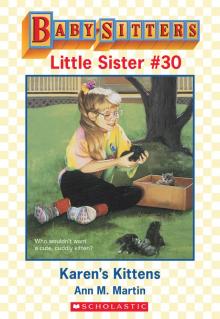 Karen's Kittens
Karen's Kittens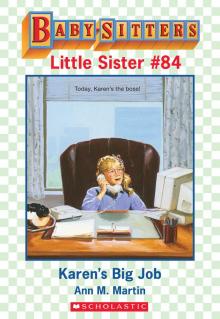 Karen's Big Job
Karen's Big Job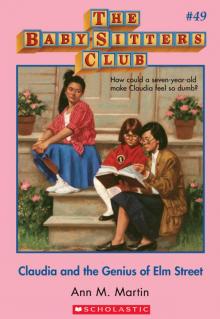 Claudia and the Genius of Elm Street
Claudia and the Genius of Elm Street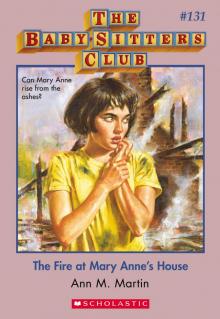 The Fire at Mary Anne's House
The Fire at Mary Anne's House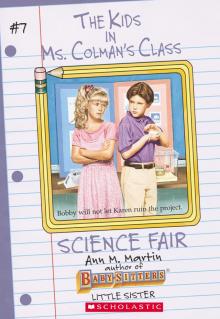 Science Fair
Science Fair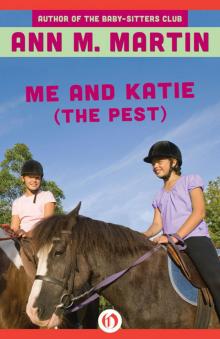 Me and Katie (The Pest)
Me and Katie (The Pest)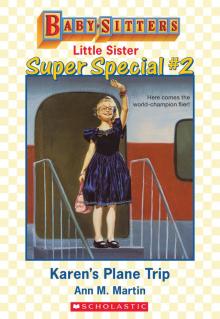 Karen's Plane Trip
Karen's Plane Trip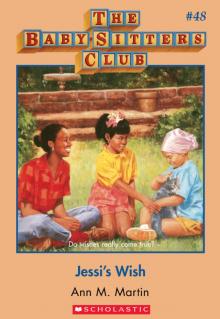 Jessi's Wish
Jessi's Wish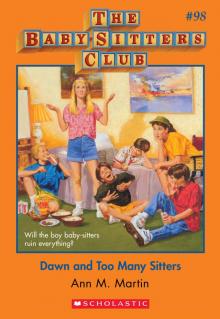 Dawn and Too Many Sitters
Dawn and Too Many Sitters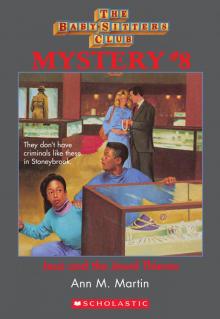 Jessi and the Jewel Thieves
Jessi and the Jewel Thieves Eleven Kids, One Summer
Eleven Kids, One Summer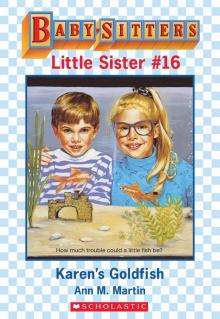 Karen's Goldfish
Karen's Goldfish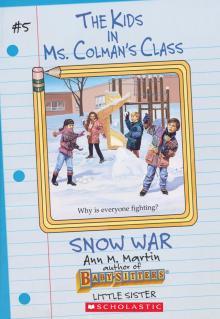 Snow War
Snow War Abby and the Secret Society
Abby and the Secret Society Keeping Secrets
Keeping Secrets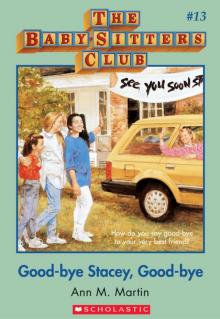 Good-Bye Stacey, Good-Bye
Good-Bye Stacey, Good-Bye Karen's Sleepover
Karen's Sleepover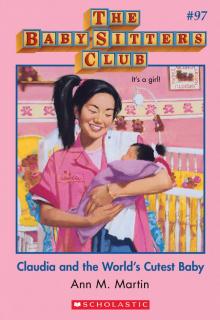 Claudia and the World's Cutest Baby
Claudia and the World's Cutest Baby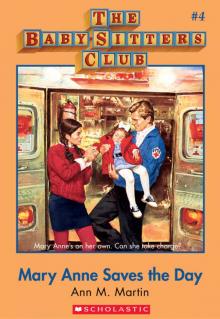 Mary Anne Saves the Day
Mary Anne Saves the Day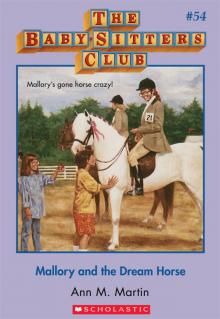 Mallory and the Dream Horse
Mallory and the Dream Horse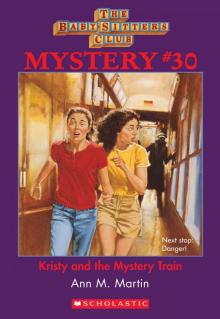 Kristy and the Mystery Train
Kristy and the Mystery Train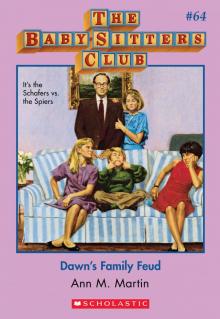 Dawn's Family Feud
Dawn's Family Feud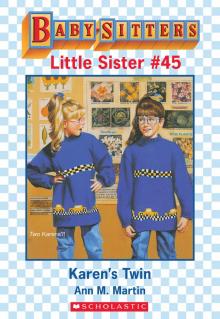 Karen's Twin
Karen's Twin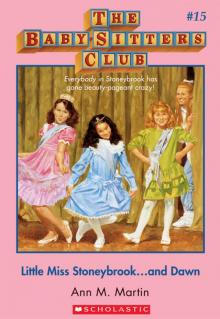 Little Miss Stoneybrook... And Dawn
Little Miss Stoneybrook... And Dawn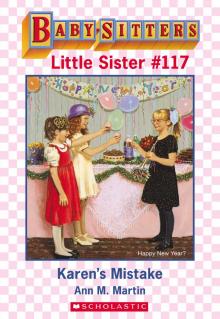 Karen's Mistake
Karen's Mistake Karen's Movie Star
Karen's Movie Star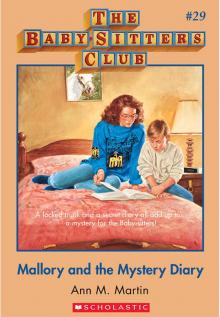 Mallory and the Mystery Diary
Mallory and the Mystery Diary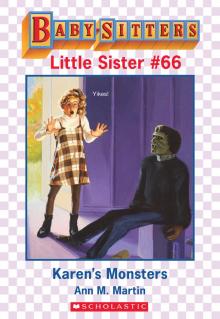 Karen's Monsters
Karen's Monsters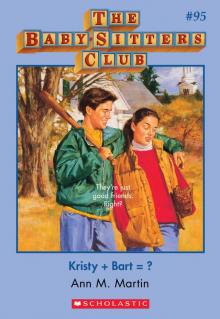 Kristy + Bart = ?
Kristy + Bart = ?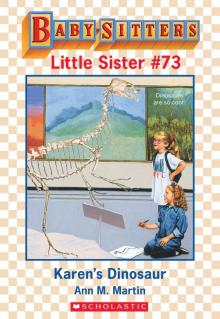 Karen's Dinosaur
Karen's Dinosaur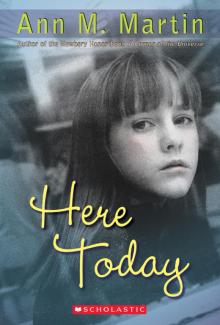 Here Today
Here Today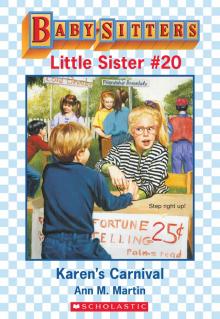 Karen's Carnival
Karen's Carnival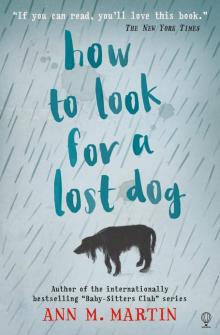 How to Look for a Lost Dog
How to Look for a Lost Dog Stacey vs. Claudia
Stacey vs. Claudia Stacey's Ex-Boyfriend
Stacey's Ex-Boyfriend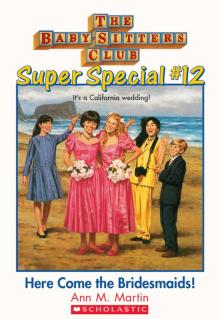 Here Come the Bridesmaids!
Here Come the Bridesmaids! Graduation Day
Graduation Day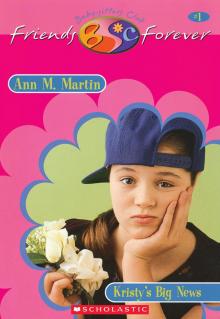 Kristy's Big News
Kristy's Big News Karen's School Surprise
Karen's School Surprise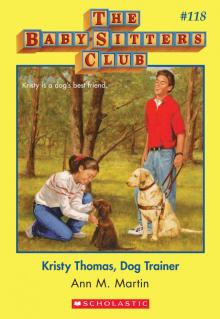 Kristy Thomas, Dog Trainer
Kristy Thomas, Dog Trainer Baby-Sitters' Christmas Chiller
Baby-Sitters' Christmas Chiller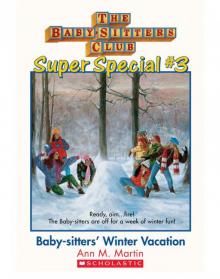 Baby-Sitters' Winter Vacation
Baby-Sitters' Winter Vacation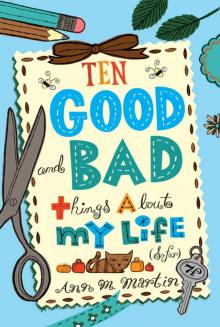 Ten Good and Bad Things About My Life
Ten Good and Bad Things About My Life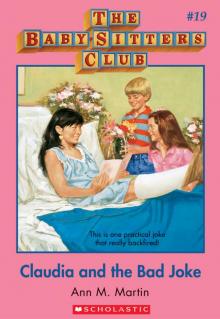 Claudia and the Bad Joke
Claudia and the Bad Joke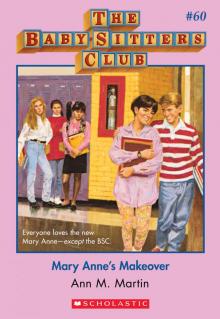 Mary Anne's Makeover
Mary Anne's Makeover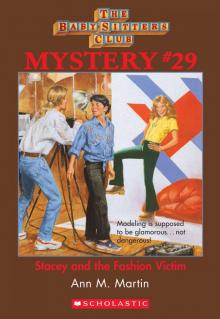 Stacey and the Fashion Victim
Stacey and the Fashion Victim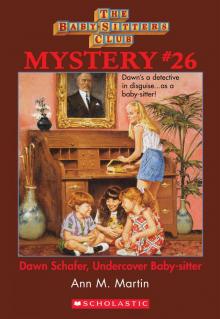 Dawn Schafer, Undercover Baby-Sitter
Dawn Schafer, Undercover Baby-Sitter Karen's Tuba
Karen's Tuba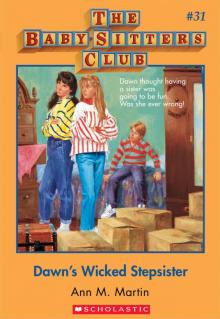 Dawn's Wicked Stepsister
Dawn's Wicked Stepsister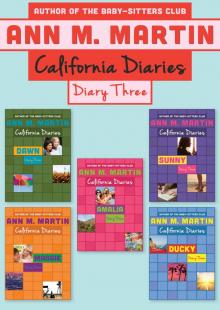 Diary Three: Dawn, Sunny, Maggie, Amalia, and Ducky
Diary Three: Dawn, Sunny, Maggie, Amalia, and Ducky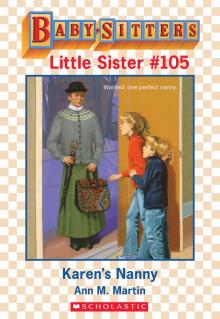 Karen's Nanny
Karen's Nanny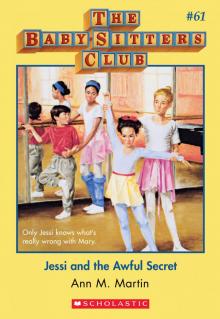 Jessi and the Awful Secret
Jessi and the Awful Secret Karen's New Year
Karen's New Year Karen's Candy
Karen's Candy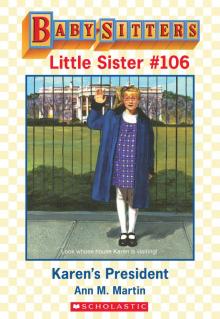 Karen's President
Karen's President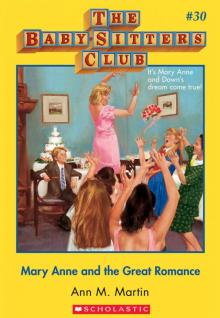 Mary Anne and the Great Romance
Mary Anne and the Great Romance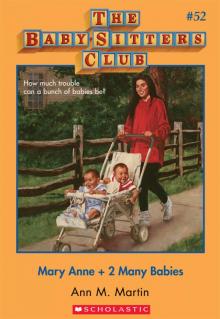 Mary Anne + 2 Many Babies
Mary Anne + 2 Many Babies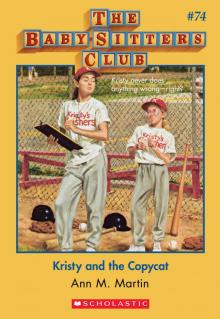 Kristy and the Copycat
Kristy and the Copycat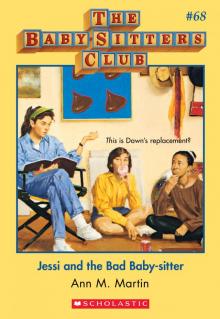 Jessi and the Bad Baby-Sitter
Jessi and the Bad Baby-Sitter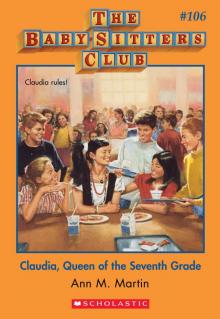 Claudia, Queen of the Seventh Grade
Claudia, Queen of the Seventh Grade Claudia and the Lighthouse Ghost
Claudia and the Lighthouse Ghost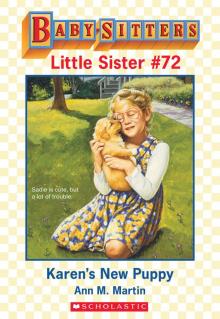 Karen's New Puppy
Karen's New Puppy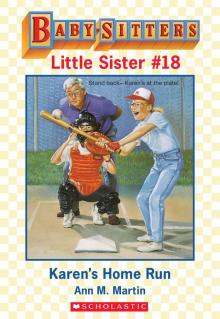 Karen's Home Run
Karen's Home Run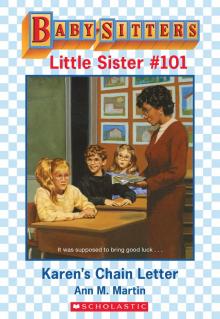 Karen's Chain Letter
Karen's Chain Letter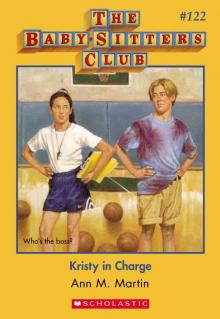 Kristy in Charge
Kristy in Charge Karen's Angel
Karen's Angel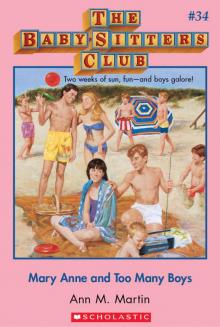 Mary Anne and Too Many Boys
Mary Anne and Too Many Boys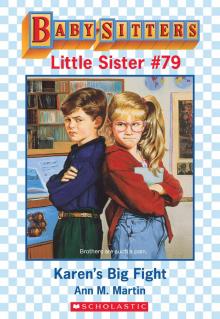 Karen's Big Fight
Karen's Big Fight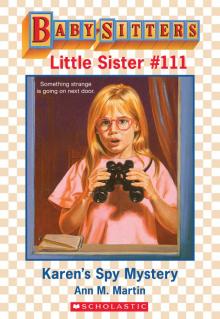 Karen's Spy Mystery
Karen's Spy Mystery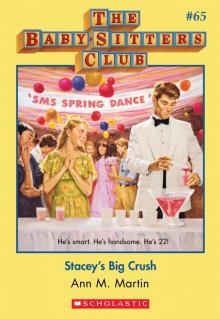 Stacey's Big Crush
Stacey's Big Crush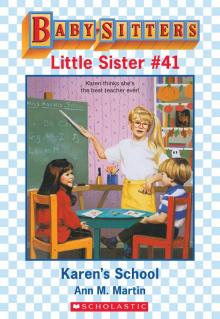 Karen's School
Karen's School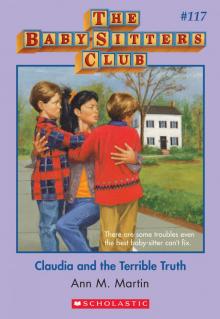 Claudia and the Terrible Truth
Claudia and the Terrible Truth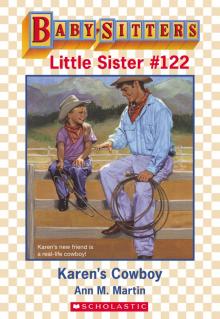 Karen's Cowboy
Karen's Cowboy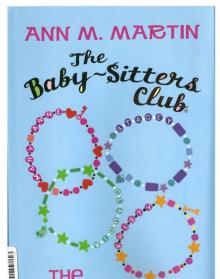 The Summer Before
The Summer Before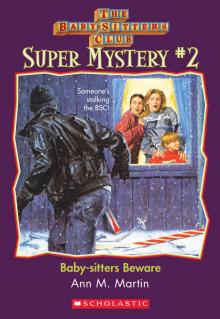 Beware, Dawn!
Beware, Dawn! Belle Teale
Belle Teale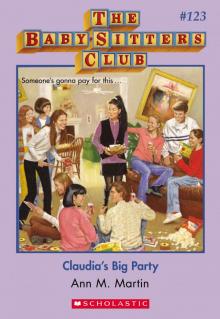 Claudia's Big Party
Claudia's Big Party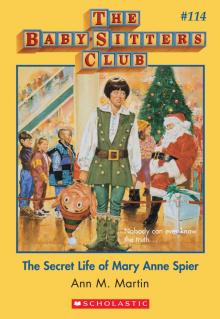 The Secret Life of Mary Anne Spier
The Secret Life of Mary Anne Spier Karen's Book
Karen's Book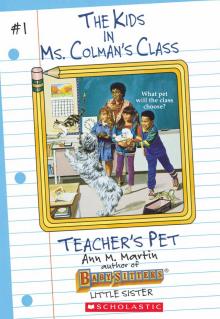 Teacher's Pet
Teacher's Pet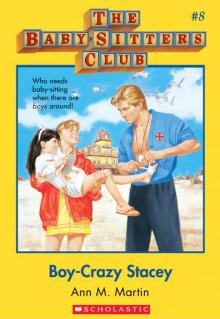 Boy-Crazy Stacey
Boy-Crazy Stacey Claudia and the Disaster Date
Claudia and the Disaster Date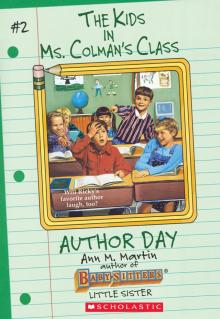 Author Day
Author Day Claudia and the Sad Good-Bye
Claudia and the Sad Good-Bye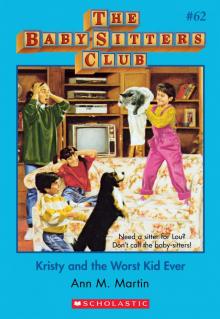 Kristy and the Worst Kid Ever
Kristy and the Worst Kid Ever Yours Turly, Shirley
Yours Turly, Shirley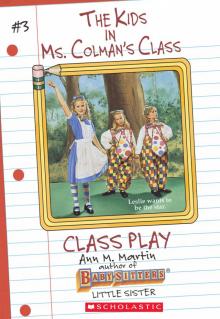 Class Play
Class Play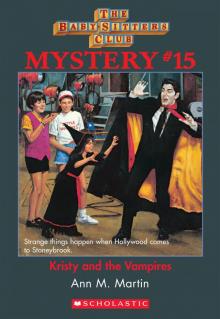 Kristy and the Vampires
Kristy and the Vampires Kristy and the Cat Burglar
Kristy and the Cat Burglar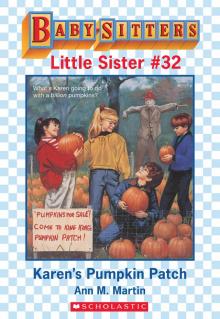 Karen's Pumpkin Patch
Karen's Pumpkin Patch Stacey and the Mystery at the Empty House
Stacey and the Mystery at the Empty House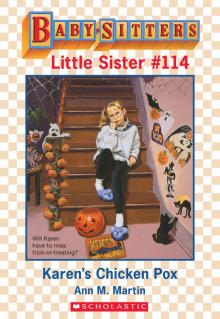 Karen's Chicken Pox
Karen's Chicken Pox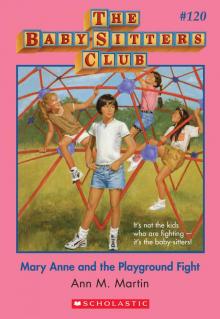 Mary Anne and the Playground Fight
Mary Anne and the Playground Fight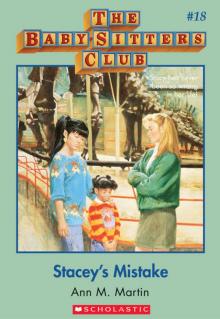 Stacey's Mistake
Stacey's Mistake Coming Apart
Coming Apart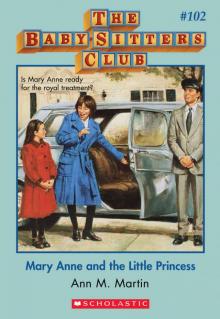 Mary Anne and the Little Princess
Mary Anne and the Little Princess Karen, Hannie and Nancy: The Three Musketeers
Karen, Hannie and Nancy: The Three Musketeers 'Tis the Season
'Tis the Season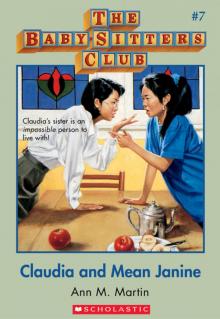 Claudia and Mean Janine
Claudia and Mean Janine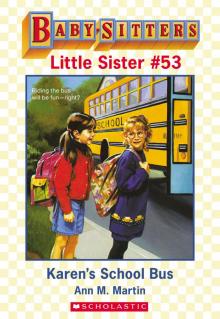 Karen's School Bus
Karen's School Bus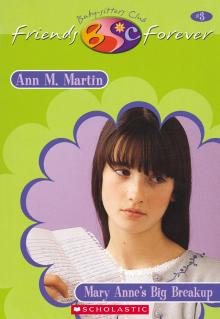 Mary Anne's Big Breakup
Mary Anne's Big Breakup Rain Reign
Rain Reign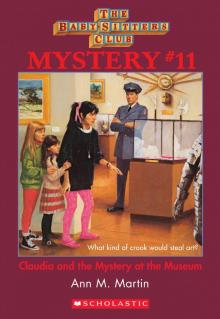 Claudia and the Mystery at the Museum
Claudia and the Mystery at the Museum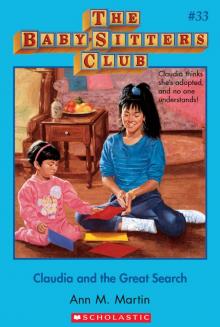 Claudia and the Great Search
Claudia and the Great Search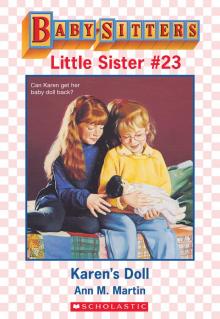 Karen's Doll
Karen's Doll Shannon's Story
Shannon's Story Sea City, Here We Come!
Sea City, Here We Come!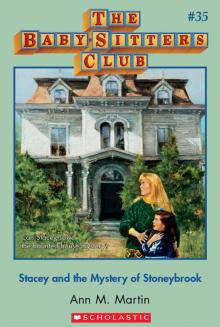 Stacey and the Mystery of Stoneybrook
Stacey and the Mystery of Stoneybrook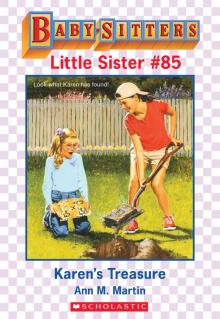 Karen's Treasure
Karen's Treasure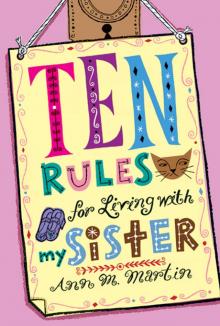 Ten Rules for Living With My Sister
Ten Rules for Living With My Sister With You and Without You
With You and Without You Baby-Sitters' Island Adventure
Baby-Sitters' Island Adventure Karen's Fishing Trip
Karen's Fishing Trip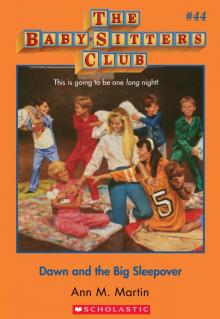 Dawn and the Big Sleepover
Dawn and the Big Sleepover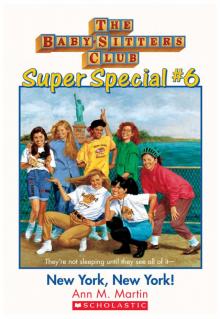 New York, New York!
New York, New York! Ten Kids, No Pets
Ten Kids, No Pets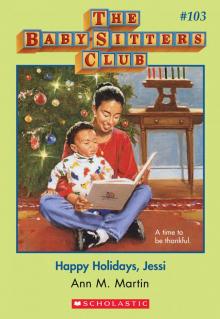 Happy Holidays, Jessi
Happy Holidays, Jessi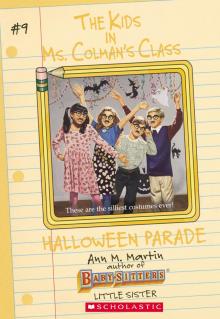 Halloween Parade
Halloween Parade Karen's New Holiday
Karen's New Holiday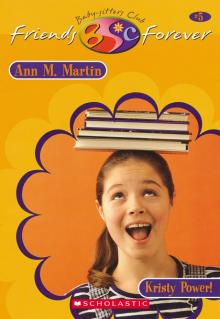 Kristy Power!
Kristy Power!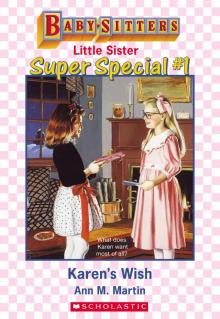 Karen's Wish
Karen's Wish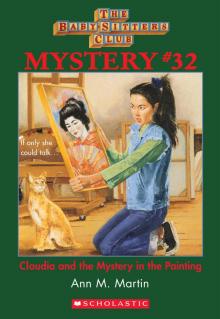 Claudia and the Mystery in the Painting
Claudia and the Mystery in the Painting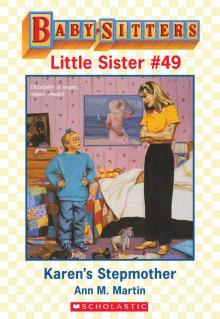 Karen's Stepmother
Karen's Stepmother Abby in Wonderland
Abby in Wonderland Karen's Snow Day
Karen's Snow Day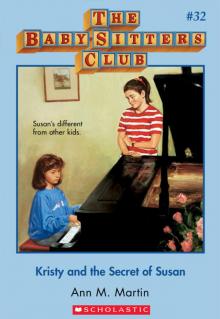 Kristy and the Secret of Susan
Kristy and the Secret of Susan Karen's Pony Camp
Karen's Pony Camp Karen's School Trip
Karen's School Trip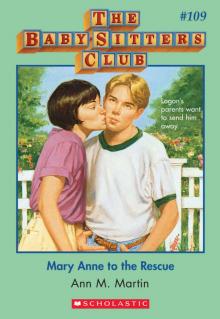 Mary Anne to the Rescue
Mary Anne to the Rescue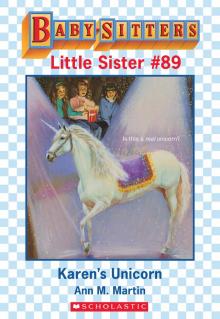 Karen's Unicorn
Karen's Unicorn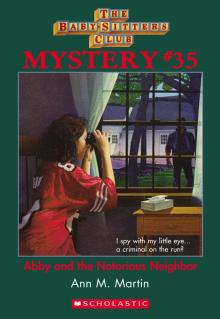 Abby and the Notorious Neighbor
Abby and the Notorious Neighbor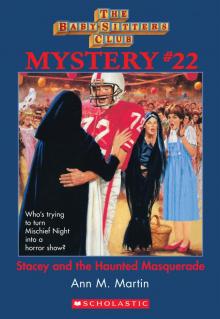 Stacey and the Haunted Masquerade
Stacey and the Haunted Masquerade Claudia Gets Her Guy
Claudia Gets Her Guy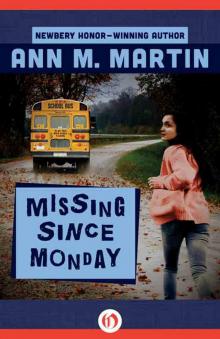 Missing Since Monday
Missing Since Monday Stacey's Choice
Stacey's Choice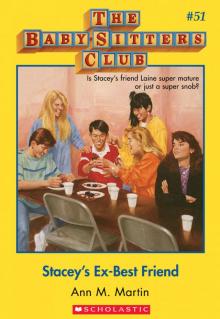 Stacey's Ex-Best Friend
Stacey's Ex-Best Friend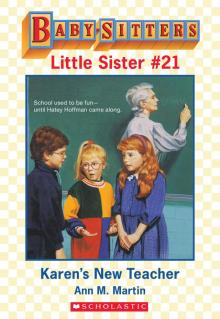 Karen's New Teacher
Karen's New Teacher Karen's Accident
Karen's Accident Karen's Lucky Penny
Karen's Lucky Penny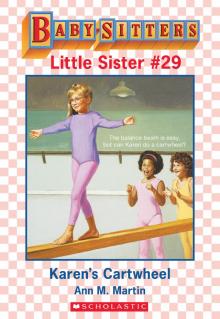 Karen's Cartwheel
Karen's Cartwheel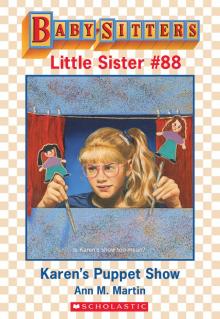 Karen's Puppet Show
Karen's Puppet Show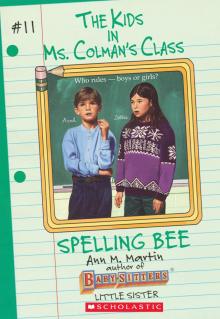 Spelling Bee
Spelling Bee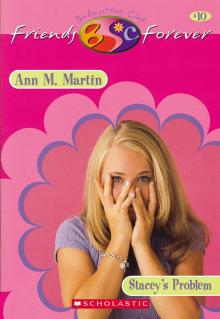 Stacey's Problem
Stacey's Problem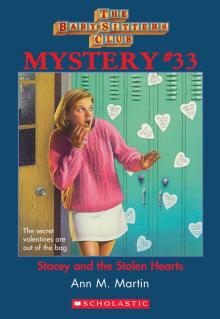 Stacey and the Stolen Hearts
Stacey and the Stolen Hearts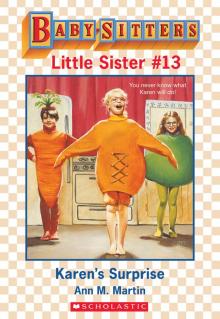 Karen's Surprise
Karen's Surprise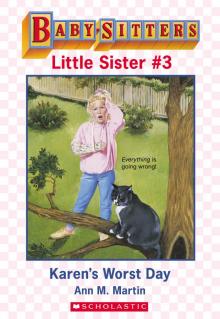 Karen's Worst Day
Karen's Worst Day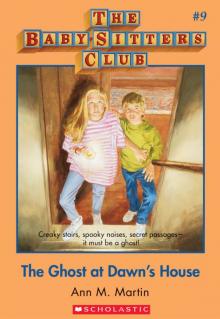 The Ghost at Dawn's House
The Ghost at Dawn's House Karen's Big Sister
Karen's Big Sister Karen's Easter Parade
Karen's Easter Parade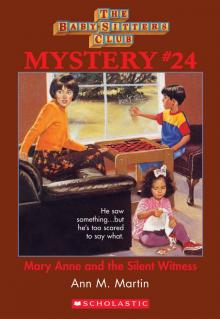 Mary Anne and the Silent Witness
Mary Anne and the Silent Witness Karen's Swim Meet
Karen's Swim Meet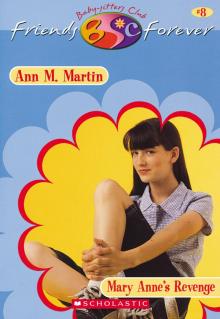 Mary Anne's Revenge
Mary Anne's Revenge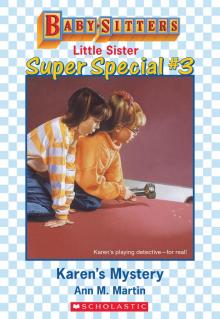 Karen's Mystery
Karen's Mystery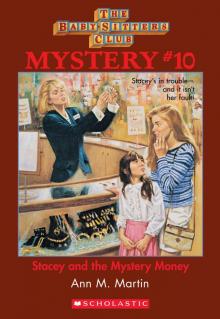 Stacey and the Mystery Money
Stacey and the Mystery Money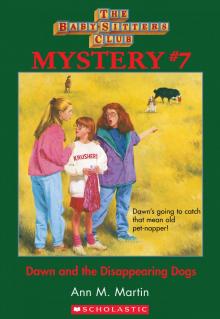 Dawn and the Disappearing Dogs
Dawn and the Disappearing Dogs Karen's Christmas Tree
Karen's Christmas Tree Welcome to Camden Falls
Welcome to Camden Falls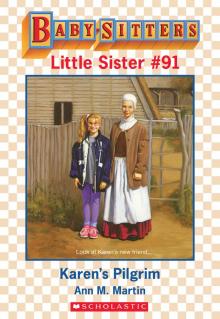 Karen's Pilgrim
Karen's Pilgrim Dawn and the Halloween Mystery
Dawn and the Halloween Mystery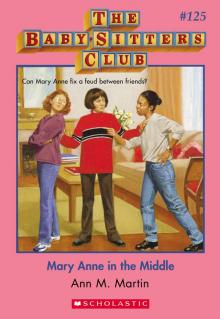 Mary Anne in the Middle
Mary Anne in the Middle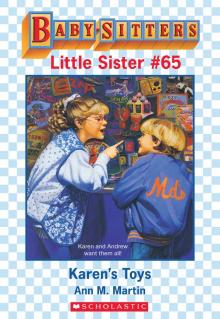 Karen's Toys
Karen's Toys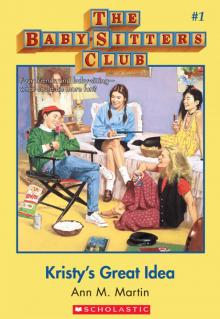 Kristy's Great Idea
Kristy's Great Idea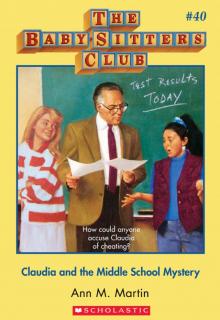 Claudia and the Middle School Mystery
Claudia and the Middle School Mystery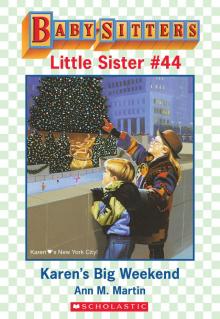 Karen's Big Weekend
Karen's Big Weekend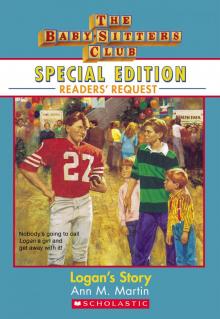 Logan's Story
Logan's Story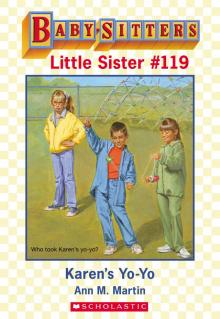 Karen's Yo-Yo
Karen's Yo-Yo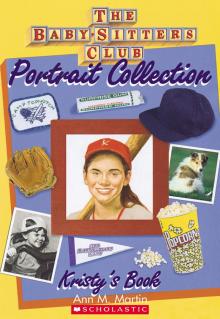 Kristy's Book
Kristy's Book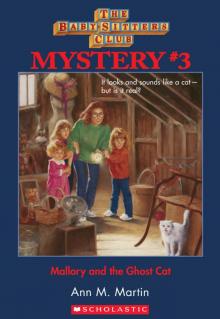 Mallory and the Ghost Cat
Mallory and the Ghost Cat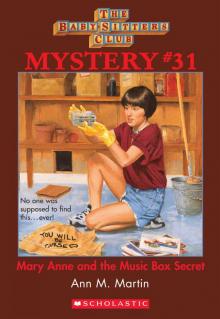 Mary Anne and the Music
Mary Anne and the Music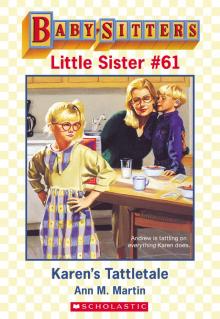 Karen's Tattletale
Karen's Tattletale Karen's County Fair
Karen's County Fair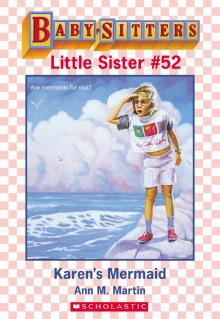 Karen's Mermaid
Karen's Mermaid Snowbound
Snowbound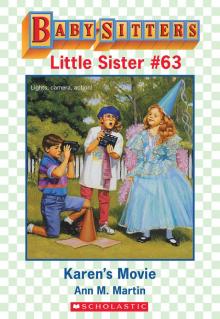 Karen's Movie
Karen's Movie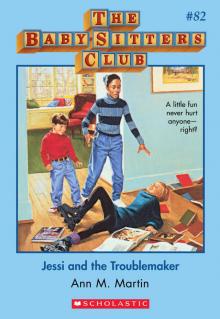 Jessi and the Troublemaker
Jessi and the Troublemaker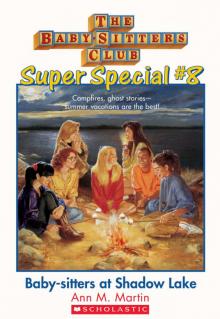 Baby-Sitters at Shadow Lake
Baby-Sitters at Shadow Lake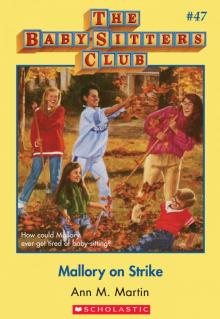 Mallory on Strike
Mallory on Strike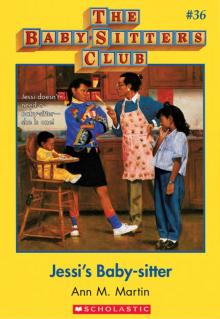 Jessi's Baby-Sitter
Jessi's Baby-Sitter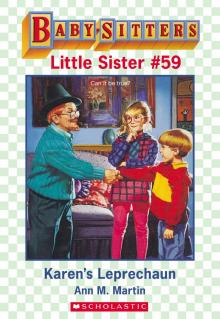 Karen's Leprechaun
Karen's Leprechaun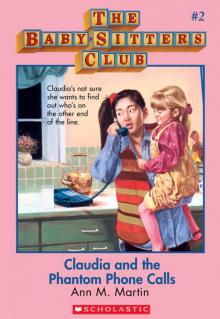 Claudia and the Phantom Phone Calls
Claudia and the Phantom Phone Calls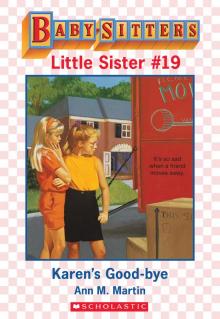 Karen's Good-Bye
Karen's Good-Bye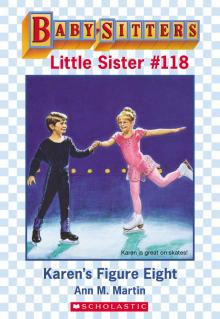 Karen's Figure Eight
Karen's Figure Eight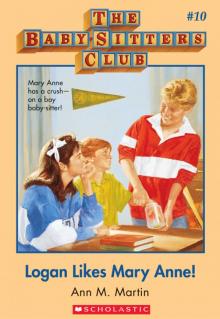 Logan Likes Mary Anne!
Logan Likes Mary Anne!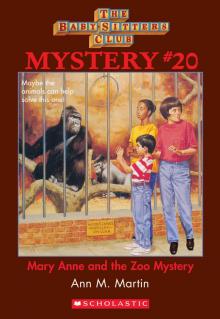 Mary Anne and the Zoo Mystery
Mary Anne and the Zoo Mystery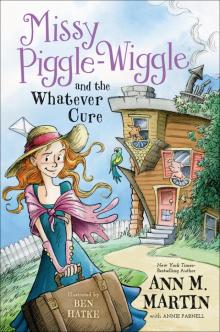 Missy Piggle-Wiggle and the Whatever Cure
Missy Piggle-Wiggle and the Whatever Cure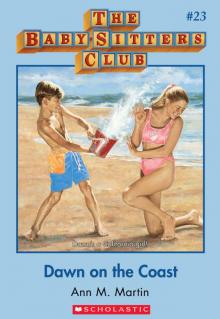 Dawn on the Coast
Dawn on the Coast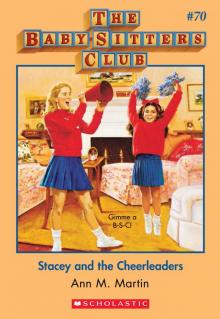 Stacey and the Cheerleaders
Stacey and the Cheerleaders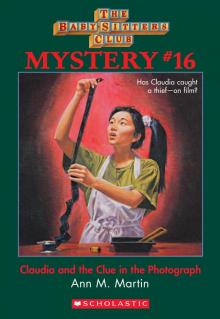 Claudia and the Clue in the Photograph
Claudia and the Clue in the Photograph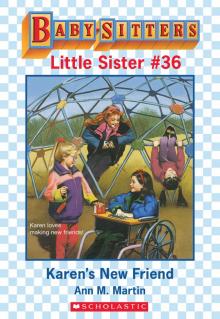 Karen's New Friend
Karen's New Friend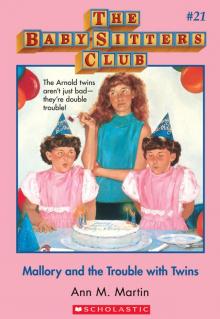 Mallory and the Trouble With Twins
Mallory and the Trouble With Twins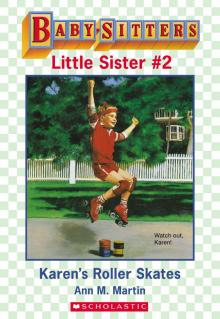 Karen's Roller Skates
Karen's Roller Skates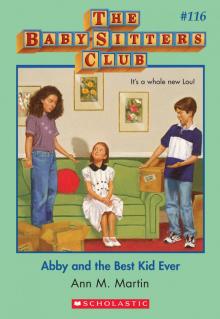 Abby and the Best Kid Ever
Abby and the Best Kid Ever Poor Mallory!
Poor Mallory!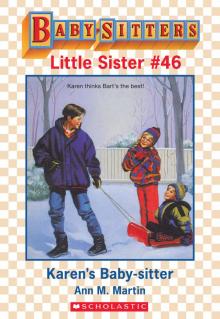 Karen's Witch
Karen's Witch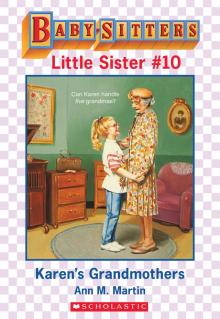 Karen's Grandmothers
Karen's Grandmothers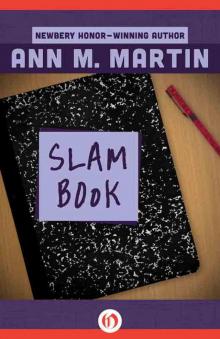 Slam Book
Slam Book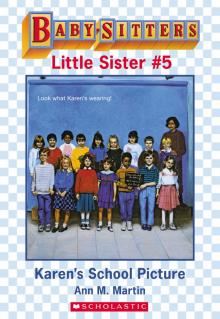 Karen's School Picture
Karen's School Picture Karen's Reindeer
Karen's Reindeer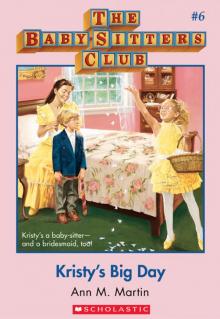 Kristy's Big Day
Kristy's Big Day The Long Way Home
The Long Way Home Karen's Sleigh Ride
Karen's Sleigh Ride On Christmas Eve
On Christmas Eve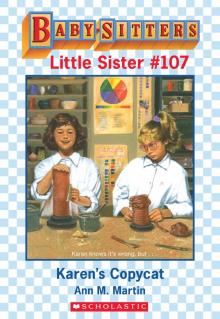 Karen's Copycat
Karen's Copycat Karen's Ice Skates
Karen's Ice Skates Claudia and the Little Liar
Claudia and the Little Liar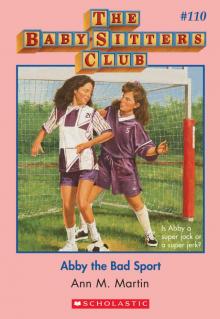 Abby the Bad Sport
Abby the Bad Sport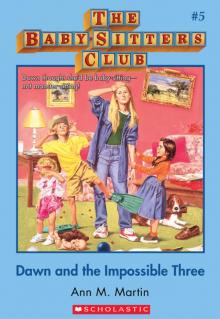 The Baby-Sitters Club #5: Dawn and the Impossible Three
The Baby-Sitters Club #5: Dawn and the Impossible Three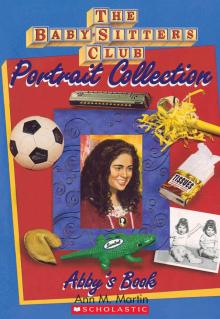 Abby's Book
Abby's Book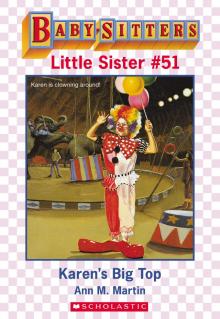 Karen's Big Top
Karen's Big Top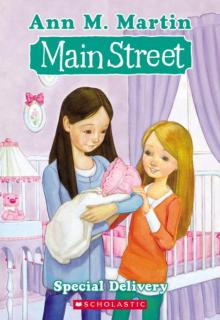 Main Street #8: Special Delivery
Main Street #8: Special Delivery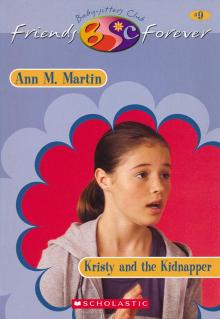 Kristy and the Kidnapper
Kristy and the Kidnapper Karen's Ski Trip
Karen's Ski Trip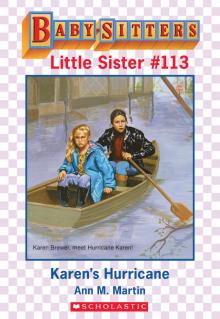 Karen's Hurricane
Karen's Hurricane Stacey and the Mystery at the Mall
Stacey and the Mystery at the Mall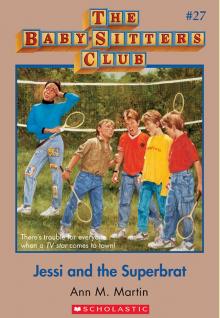 Jessi and the Superbrat
Jessi and the Superbrat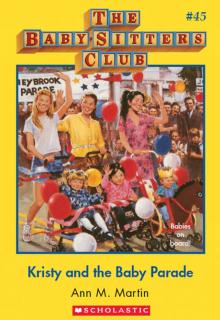 Kristy and the Baby Parade
Kristy and the Baby Parade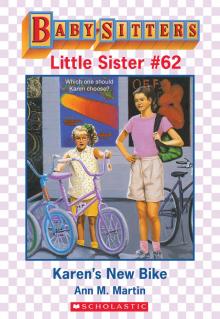 Karen's New Bike
Karen's New Bike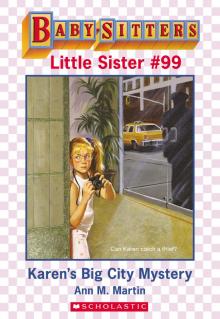 Karen's Big City Mystery
Karen's Big City Mystery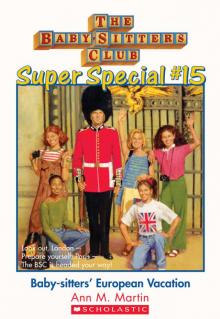 Baby-Sitters' European Vacation
Baby-Sitters' European Vacation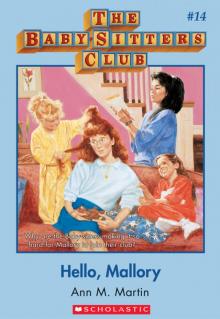 Hello, Mallory
Hello, Mallory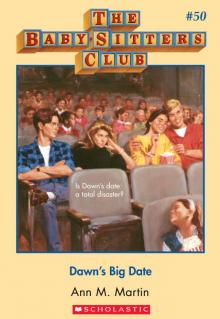 Dawn's Big Date
Dawn's Big Date Karen's Christmas Carol
Karen's Christmas Carol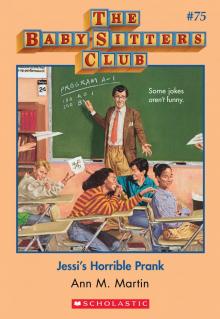 Jessi's Horrible Prank
Jessi's Horrible Prank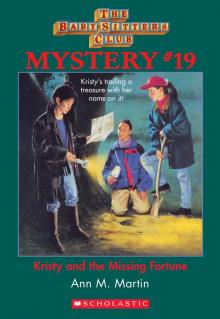 Kristy and the Missing Fortune
Kristy and the Missing Fortune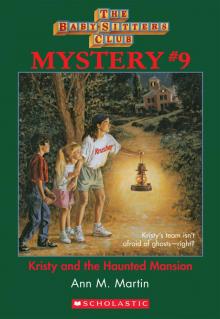 Kristy and the Haunted Mansion
Kristy and the Haunted Mansion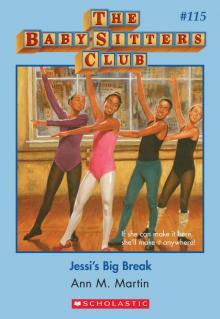 Jessi's Big Break
Jessi's Big Break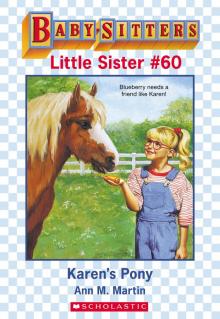 Karen's Pony
Karen's Pony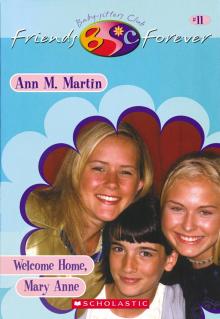 Welcome Home, Mary Anne
Welcome Home, Mary Anne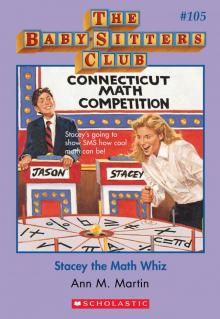 Stacey the Math Whiz
Stacey the Math Whiz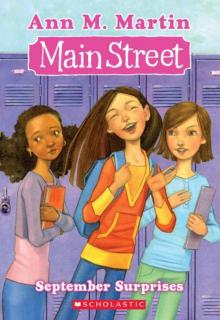 September Surprises
September Surprises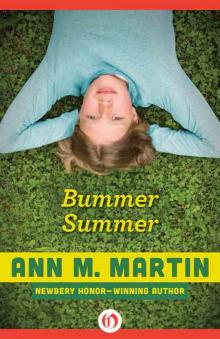 Bummer Summer
Bummer Summer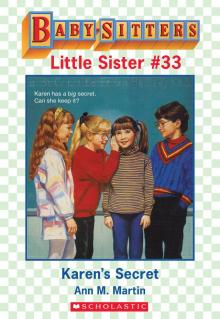 Karen's Secret
Karen's Secret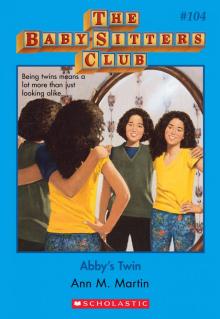 Abby's Twin
Abby's Twin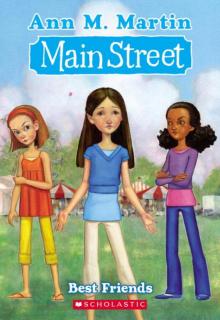 Main Street #4: Best Friends
Main Street #4: Best Friends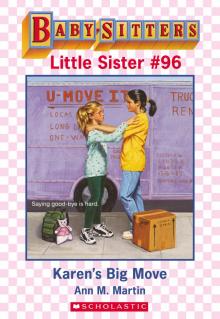 Karen's Big Move
Karen's Big Move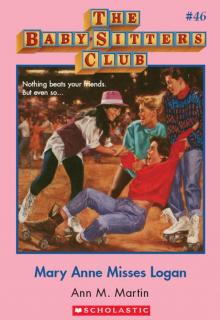 Mary Anne Misses Logan
Mary Anne Misses Logan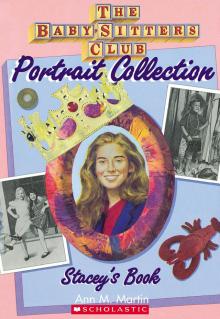 Stacey's Book
Stacey's Book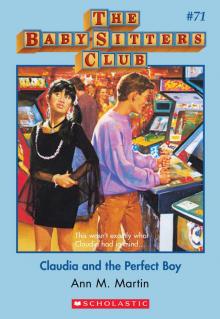 Claudia and the Perfect Boy
Claudia and the Perfect Boy Holiday Time
Holiday Time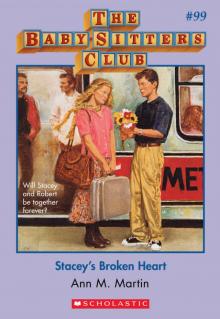 Stacey's Broken Heart
Stacey's Broken Heart Karen's Field Day
Karen's Field Day Kristy's Worst Idea
Kristy's Worst Idea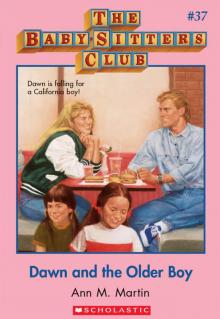 Dawn and the Older Boy
Dawn and the Older Boy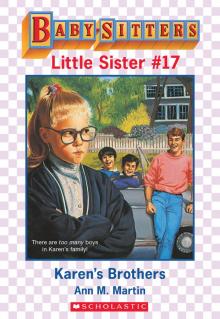 Karen's Brothers
Karen's Brothers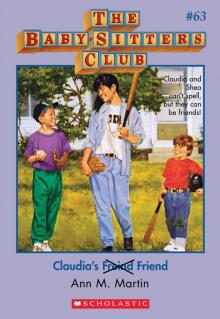 Claudia's Friend
Claudia's Friend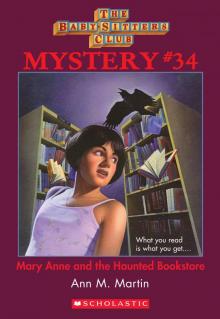 Mary Anne and the Haunted Bookstore
Mary Anne and the Haunted Bookstore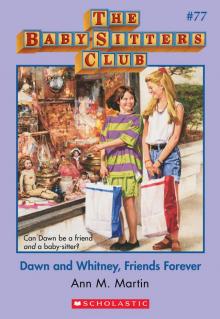 Dawn and Whitney, Friends Forever
Dawn and Whitney, Friends Forever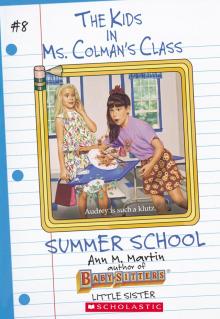 Summer School
Summer School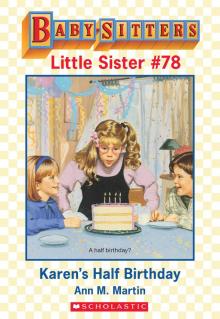 Karen's Birthday
Karen's Birthday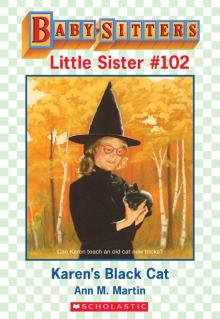 Karen's Black Cat
Karen's Black Cat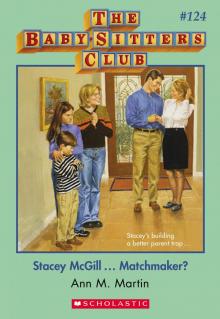 Stacey McGill... Matchmaker?
Stacey McGill... Matchmaker?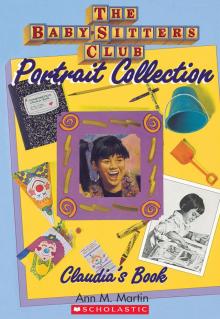 Claudia's Book
Claudia's Book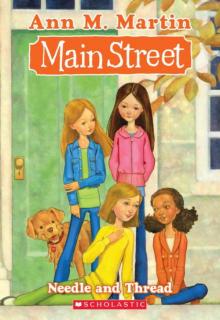 Main Street #2: Needle and Thread
Main Street #2: Needle and Thread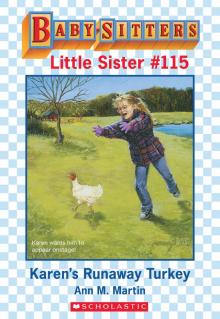 Karen's Runaway Turkey
Karen's Runaway Turkey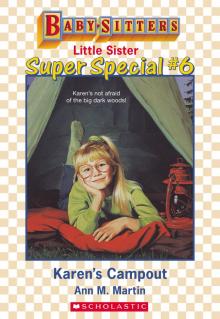 Karen's Campout
Karen's Campout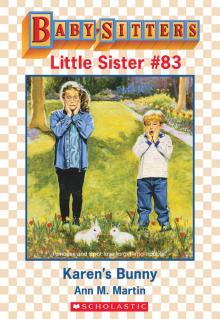 Karen's Bunny
Karen's Bunny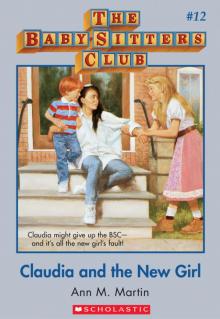 Claudia and the New Girl
Claudia and the New Girl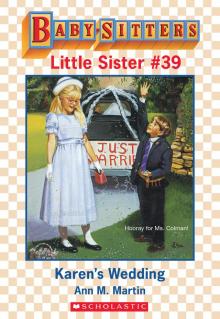 Karen's Wedding
Karen's Wedding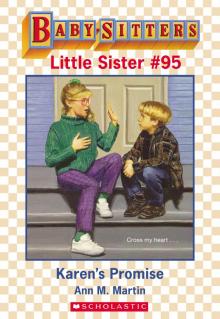 Karen's Promise
Karen's Promise Karen's Snow Princess
Karen's Snow Princess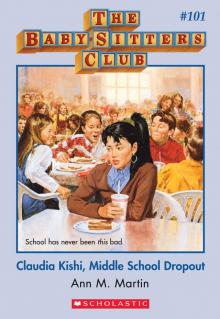 Claudia Kishi, Middle School Dropout
Claudia Kishi, Middle School Dropout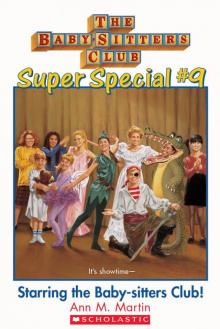 Starring the Baby-Sitters Club!
Starring the Baby-Sitters Club!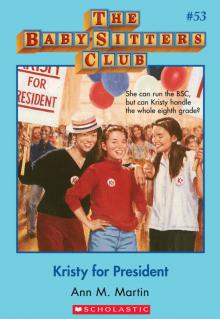 Kristy for President
Kristy for President California Girls!
California Girls!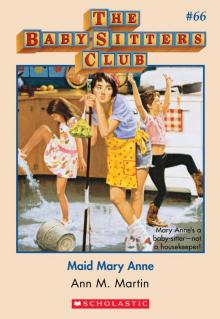 Maid Mary Anne
Maid Mary Anne Abby's Un-Valentine
Abby's Un-Valentine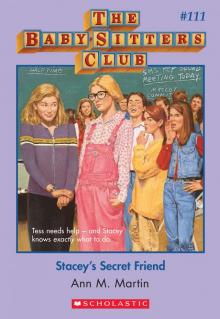 Stacey's Secret Friend
Stacey's Secret Friend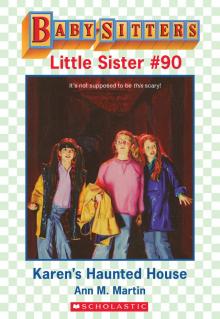 Karen's Haunted House
Karen's Haunted House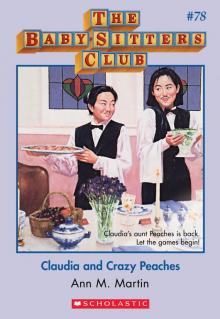 Claudia and Crazy Peaches
Claudia and Crazy Peaches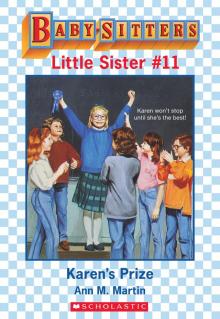 Karen's Prize
Karen's Prize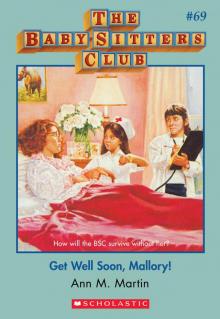 Get Well Soon, Mallory!
Get Well Soon, Mallory!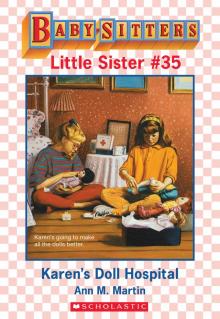 Karen's Doll Hospital
Karen's Doll Hospital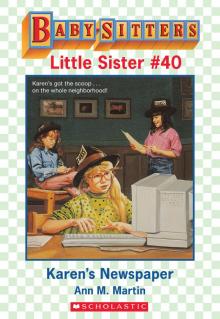 Karen's Newspaper
Karen's Newspaper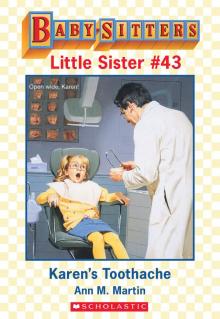 Karen's Toothache
Karen's Toothache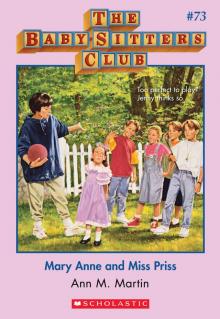 Mary Anne and Miss Priss
Mary Anne and Miss Priss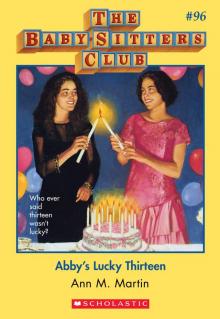 Abby's Lucky Thirteen
Abby's Lucky Thirteen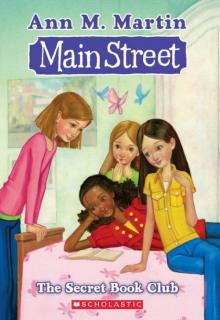 The Secret Book Club
The Secret Book Club The All-New Mallory Pike
The All-New Mallory Pike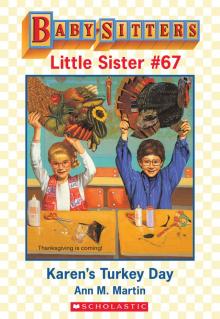 Karen's Turkey Day
Karen's Turkey Day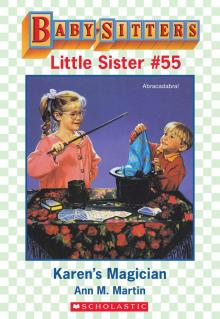 Karen's Magician
Karen's Magician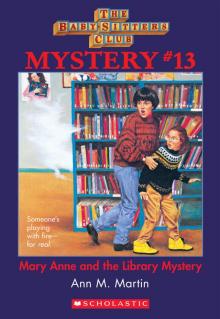 Mary Anne and the Library Mystery
Mary Anne and the Library Mystery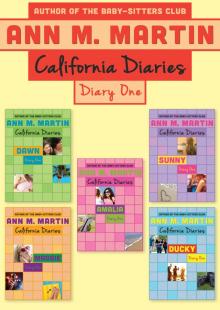 Diary One: Dawn, Sunny, Maggie, Amalia, and Ducky
Diary One: Dawn, Sunny, Maggie, Amalia, and Ducky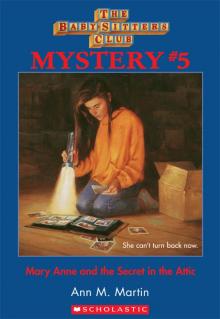 Mary Anne and the Secret in the Attic
Mary Anne and the Secret in the Attic Kristy and the Mother's Day Surprise
Kristy and the Mother's Day Surprise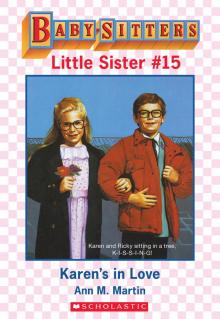 Karen's in Love
Karen's in Love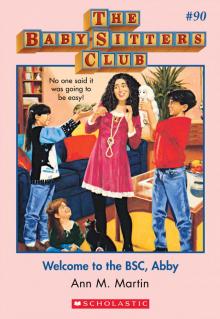 Welcome to the BSC, Abby
Welcome to the BSC, Abby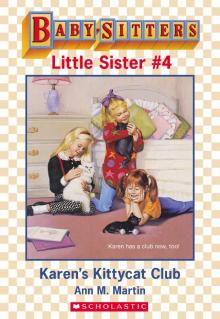 Karen's Kittycat Club
Karen's Kittycat Club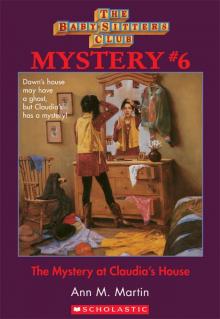 The Mystery at Claudia's House
The Mystery at Claudia's House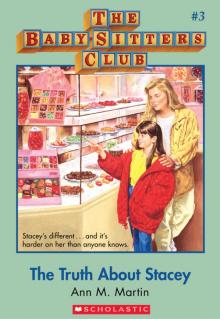 The Truth About Stacey
The Truth About Stacey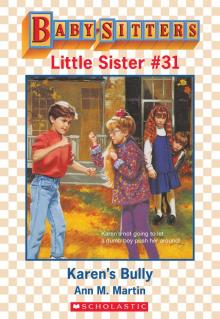 Karen's Bully
Karen's Bully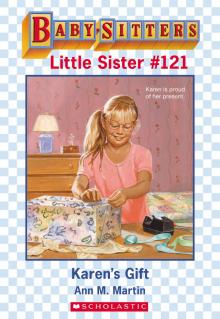 Karen's Gift
Karen's Gift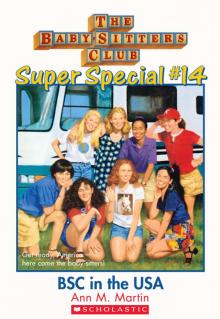 BSC in the USA
BSC in the USA Everything for a Dog
Everything for a Dog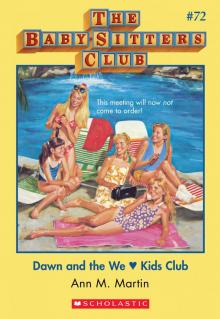 Dawn and the We Love Kids Club
Dawn and the We Love Kids Club Karen's Ghost
Karen's Ghost Stacey's Lie
Stacey's Lie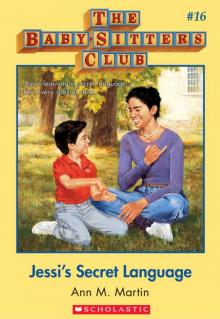 Jessi's Secret Language
Jessi's Secret Language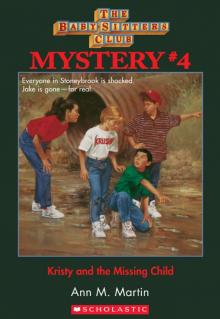 Kristy and the Missing Child
Kristy and the Missing Child Better to Wish
Better to Wish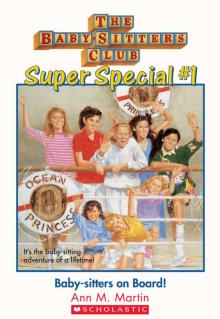 Baby-Sitters on Board!
Baby-Sitters on Board!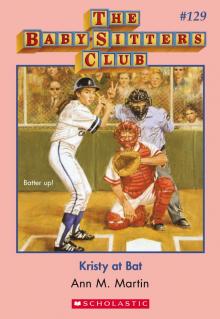 Kristy at Bat
Kristy at Bat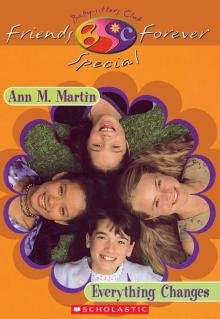 Everything Changes
Everything Changes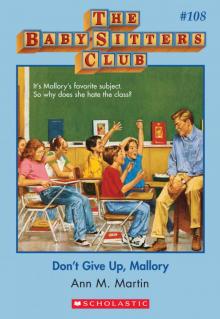 Don't Give Up, Mallory
Don't Give Up, Mallory A Dog's Life: The Autobiography of a Stray
A Dog's Life: The Autobiography of a Stray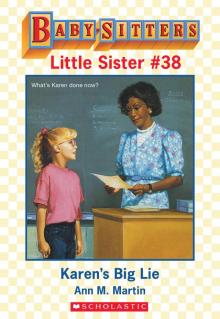 Karen's Big Lie
Karen's Big Lie Karen's Show and Share
Karen's Show and Share Mallory Hates Boys (and Gym)
Mallory Hates Boys (and Gym) Diary Two: Dawn, Sunny, Maggie, Amalia, and Ducky
Diary Two: Dawn, Sunny, Maggie, Amalia, and Ducky Karen's Pen Pal
Karen's Pen Pal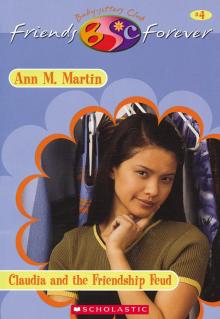 Claudia and the Friendship Feud
Claudia and the Friendship Feud Karen's Secret Valentine
Karen's Secret Valentine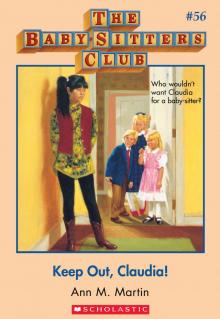 Keep Out, Claudia!
Keep Out, Claudia! Aloha, Baby-Sitters!
Aloha, Baby-Sitters!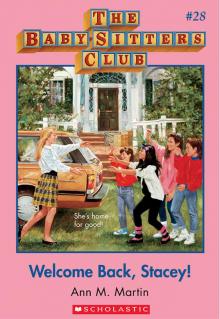 Welcome Back, Stacey
Welcome Back, Stacey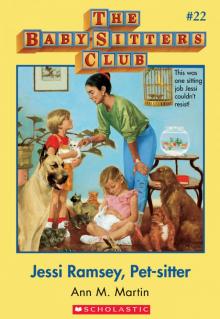 Jessi Ramsey, Pet-Sitter
Jessi Ramsey, Pet-Sitter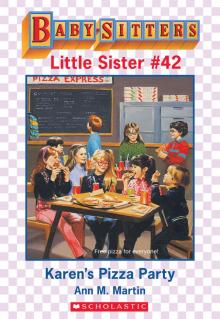 Karen's Pizza Party
Karen's Pizza Party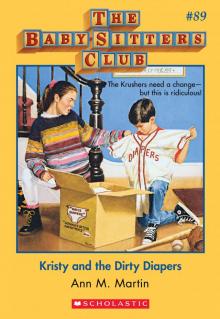 Kristy and the Dirty Diapers
Kristy and the Dirty Diapers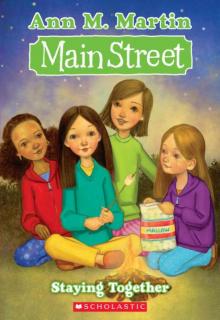 Staying Together
Staying Together Dawn and the Surfer Ghost
Dawn and the Surfer Ghost Claudia Makes Up Her Mind
Claudia Makes Up Her Mind Jessi's Gold Medal
Jessi's Gold Medal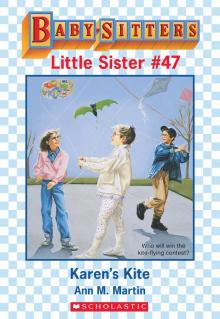 Karen's Kite
Karen's Kite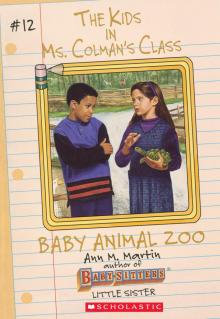 Baby Animal Zoo
Baby Animal Zoo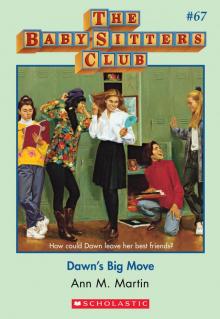 Dawn's Big Move
Dawn's Big Move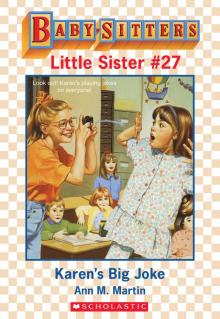 Karen's Big Joke
Karen's Big Joke Karen's Lemonade Stand
Karen's Lemonade Stand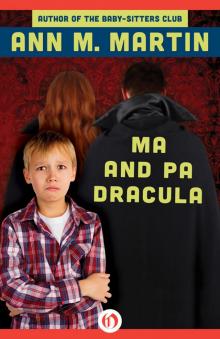 Ma and Pa Dracula
Ma and Pa Dracula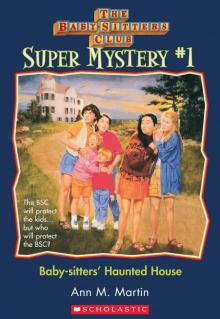 Baby-Sitters' Haunted House
Baby-Sitters' Haunted House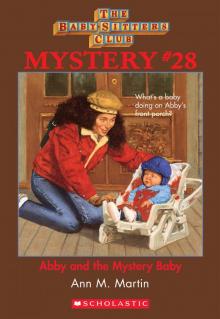 Abby and the Mystery Baby
Abby and the Mystery Baby Home Is the Place
Home Is the Place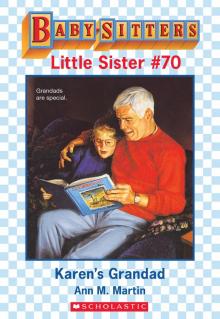 Karen's Grandad
Karen's Grandad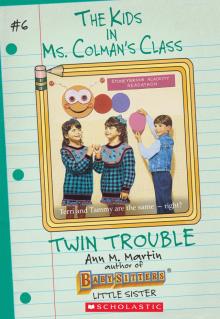 Twin Trouble
Twin Trouble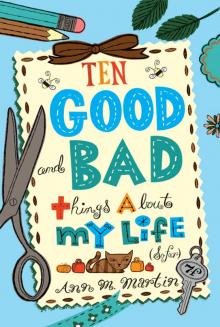 Ten Good and Bad Things About My Life (So Far)
Ten Good and Bad Things About My Life (So Far) Diary Two
Diary Two Baby-Sitters Club 027
Baby-Sitters Club 027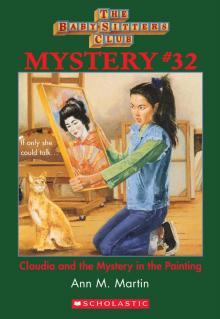 Claudia and the Mystery Painting
Claudia and the Mystery Painting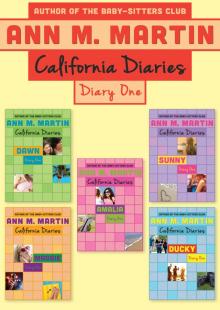 Diary One
Diary One Baby-Sitters Club 037
Baby-Sitters Club 037 Baby-Sitters Club 028
Baby-Sitters Club 028 Baby-Sitters Club 085
Baby-Sitters Club 085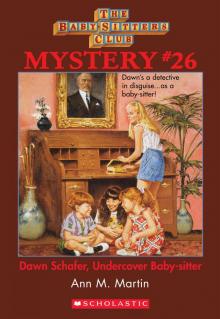 Dawn Schaffer Undercover Baby-Sitter
Dawn Schaffer Undercover Baby-Sitter Jessi's Babysitter
Jessi's Babysitter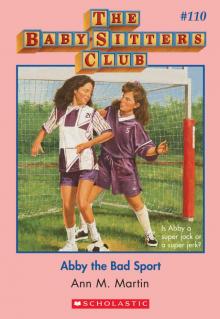 The Baby-Sitters Club #110: Abby the Bad Sport (Baby-Sitters Club, The)
The Baby-Sitters Club #110: Abby the Bad Sport (Baby-Sitters Club, The) Karen's Little Sister
Karen's Little Sister Baby-Sitters Club 058
Baby-Sitters Club 058 Claudia And The Genius On Elm St.
Claudia And The Genius On Elm St.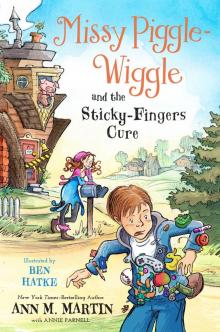 Missy Piggle-Wiggle and the Sticky-Fingers Cure
Missy Piggle-Wiggle and the Sticky-Fingers Cure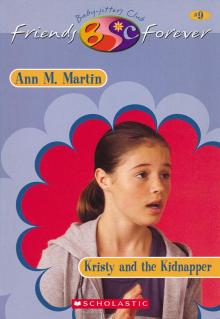 Kristy and Kidnapper
Kristy and Kidnapper Baby-Sitters Club 041
Baby-Sitters Club 041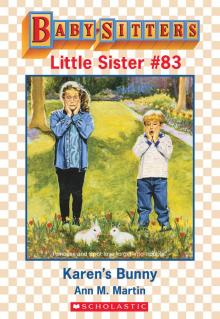 Karen's Bunny Trouble
Karen's Bunny Trouble Baby-Sitters Club 032
Baby-Sitters Club 032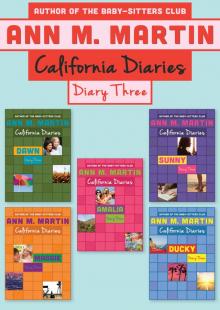 Diary Three
Diary Three Christmas Chiller
Christmas Chiller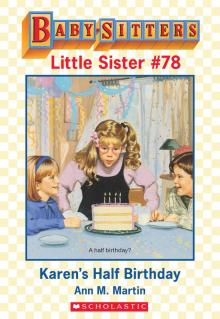 Karen's Half-Birthday
Karen's Half-Birthday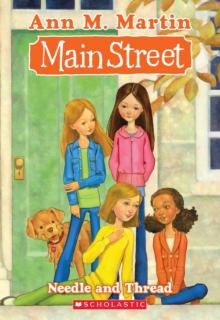 Needle and Thread
Needle and Thread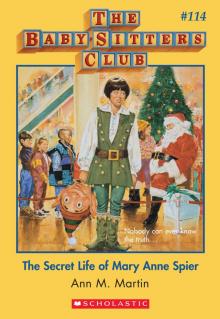 Secret Life of Mary Anne Spier
Secret Life of Mary Anne Spier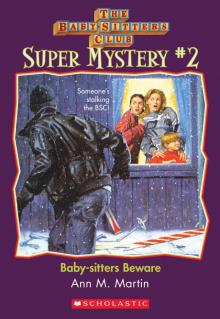 Baby-Sitters Beware
Baby-Sitters Beware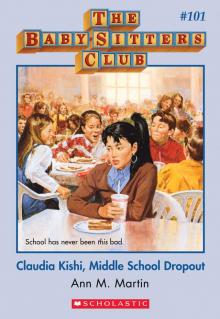 Claudia Kishi, Middle School Drop-Out
Claudia Kishi, Middle School Drop-Out Logan Likes Mary Anne !
Logan Likes Mary Anne ! Baby-Sitters Club 061
Baby-Sitters Club 061 Best Friends
Best Friends Baby-Sitters Club 031
Baby-Sitters Club 031 Karen's Little Witch
Karen's Little Witch Jessi Ramsey, Petsitter
Jessi Ramsey, Petsitter Baby-Sitters Club 123
Baby-Sitters Club 123 Baby-Sitters Club 059
Baby-Sitters Club 059 Baby-Sitters Club 033
Baby-Sitters Club 033 Baby-Sitters Club 060
Baby-Sitters Club 060 Baby-Sitters Club 094
Baby-Sitters Club 094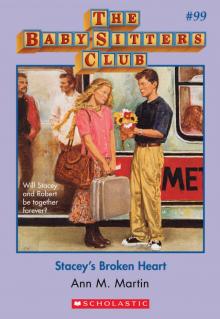 The Baby-Sitters Club #99: Stacey's Broken Heart
The Baby-Sitters Club #99: Stacey's Broken Heart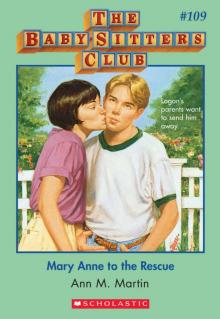 The Baby-Sitters Club #109: Mary Anne to the Rescue (Baby-Sitters Club, The)
The Baby-Sitters Club #109: Mary Anne to the Rescue (Baby-Sitters Club, The) Mystery At Claudia's House
Mystery At Claudia's House Claudia And The Sad Goodbye
Claudia And The Sad Goodbye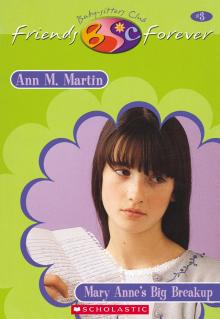 Mary Anne's Big Break-Up
Mary Anne's Big Break-Up Baby-Sitters Club 025
Baby-Sitters Club 025 Baby-Sitters Club 042
Baby-Sitters Club 042 Stacey and the Mystery of the Empty House
Stacey and the Mystery of the Empty House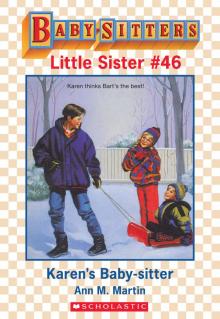 Karen's Baby-Sitter
Karen's Baby-Sitter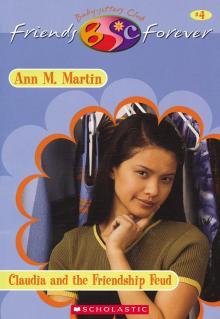 Claudia's Friendship Feud
Claudia's Friendship Feud Baby-Sitters Club 090
Baby-Sitters Club 090 Baby-Sitters Club 021
Baby-Sitters Club 021 Baby-Sitters Club 056
Baby-Sitters Club 056 Baby-Sitters Club 040
Baby-Sitters Club 040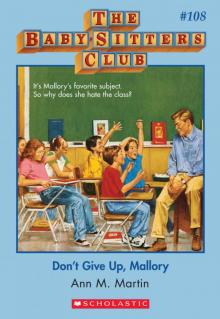 The Baby-Sitters Club #108: Don't Give Up, Mallory (Baby-Sitters Club, The)
The Baby-Sitters Club #108: Don't Give Up, Mallory (Baby-Sitters Club, The)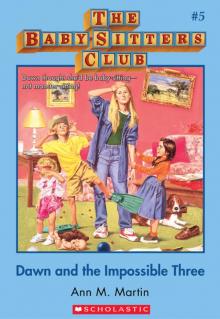 Dawn and the Impossible Three
Dawn and the Impossible Three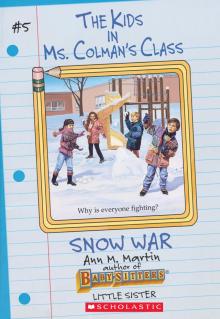 The Snow War
The Snow War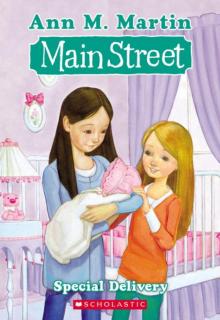 Special Delivery
Special Delivery Baby-Sitters Club 057
Baby-Sitters Club 057 Mary Anne And Too Many Babies
Mary Anne And Too Many Babies Baby-Sitters Club 030
Baby-Sitters Club 030